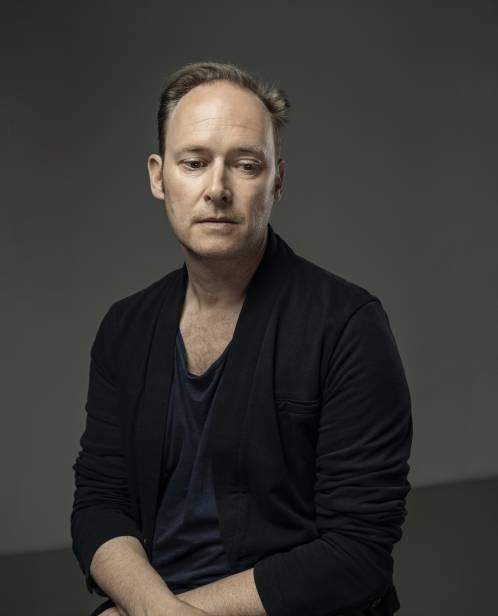Futurism Restated: Michael Mayer on 20 Years of Fabric 13
The Kompakt co-founder looks back on his landmark 2003 mix and talks about the changing winds of dance music
This is a post for paying subscribers. I’m off at Unsound this week, so the regular new-music roundup will resume next week.
A week or so ago, I listened to Michael Mayer’s Fabric 13 mix for the first time in years. It was a pivotal mix for me when it came out, and I was thrilled to find that it still sounded amazing—not just a snapshot of the era in which it was made, but a whole world unto itself, a collection of interwoven short stories. Heiko Voss’ “I Think About You (Geiger Mix)” is the perfect opener—sentimental, mysterious, as much a pop song as a club track. The mix into Richard Davis’ “Bring Me Closer” is somehow both seamless and striking, like a magician’s sleight of hand. Then—still completely in key, as though all three songs had sprung from the same source—comes Westbam and Nena’s “Oldschool, Baby,” a piano-house anthem for the ages. I was actually surprised to hear it turn up so early in the mix; I remembered it being the climax of the set. The mix goes on like that, step by step, chapter by chapter. Ricardo Villalobos’ “Easy Lee” is another high point, a bittersweet pinnacle of melodic minimal, far more emotive than most of what that genre produced; Magnet’s “Abendstern” and Superpitcher’s “Mushroom” make for a passage of what you might call deep trance, an abbreviated segment of peak-time reverie. More than anything, the set feels like an essential encapsulation of Mayer’s unique style—the harmonic mixing, the careful pacing, the unexpected twists and turns, and the abiding love for a good tearjerker deployed at just the right moment.
Looking at Discogs, I was floored to realize that the mix came out in 2003, 20 years ago. It got me thinking about how much has changed since then in dance music, listening habits, and the whole culture around DJ mixes.
Listening back triggered some surprisingly nostalgic emotions. It was a formative period for me in terms of dance music. I’d been following various forms of techno since 1997 or 1998, having first gotten into electronic music via Warp and Rephlex. But somehow Mayer’s Fabric 13 felt different: I’d been watching that scene develop for a few years, via Profan and Studio 1 and then the fledgling Kompakt itself, so rather than feeling like an outsider looking in, I felt somehow a part of it, a member of its intended audience—that this music was speaking directly to listeners like me.
I spent a few days listening back to all of Michael Mayer’s canonical mixes—the three volumes of Immer and, repeatedly, 1998’s Michael Mayer Präsentiert Kompakt Köln, aka Neuhouse. (All those hyperlinks go to Apple Music, since they’re fully licensed there, with revenue shares going back to the original producers, but they’re all on YouTube as well, if you’re not an Apple Music subscriber and you want to listen.) I still don’t recall where I got Neuhouse (Bent Crayon mail order, maybe?), but I remember feeling like I’d never heard anything like it—its stark, monochromatic palette; its lean, linear mixing; but also its slightly lush, dreamy sensibility (thanks in large part to the semi-ambient intro of Kandis and then two overlapping mixes of Herbert and Dani Siciliano’s “Going Round”). I marveled at the fact that Neuhouse is 25 years old this year. Then I did some quick calculations and I realized that its release date is far closer to the birth of house music (if we’re going by Jesse Saunders’ 1984 track “On & On”) than it is to today—14 years after year zero versus 25 years between then and now—and my head exploded.
I decided that I wanted to speak to Mayer, to ask him what he thought about those mixes today, as well as some of the changes that have happened in dance music in that time. To my immense gratification, he was into it. In fact, it transpired that he had just listed back to Fabric 13 himself, also for the first time in years. Serendipity.
We spoke over Zoom; he sat in the employee kitchen (the “canteen,” he called it) in Kompakt’s offices in Cologne, upstairs from the shop. After some parental chit-chat about what music our kids are into—his son is 16 and likes drill artists like Destroy Lonely; his daughter is 12 and likes Doja Cat (“but she hates Taylor Swift, so she’s a good girl”)—we got into it. We talked about his memories of recording the set; how the culture around mixes has changed; and his thoughts on the new generation of ravers that could care less about Kompakt and its, shall we say, historicist values. (He even brought me up to date on DJ Heartstring.) He also hinted that new music from him is on the horizon—which, if you’ve heard his new track “Talmi,” on Total 23, is very good news indeed.
Read on for the full interview. It’s exclusive to paying subscribers; if you’re not one, perhaps today’s the day?
Keep reading with a 7-day free trial
Subscribe to Futurism Restated to keep reading this post and get 7 days of free access to the full post archives.





